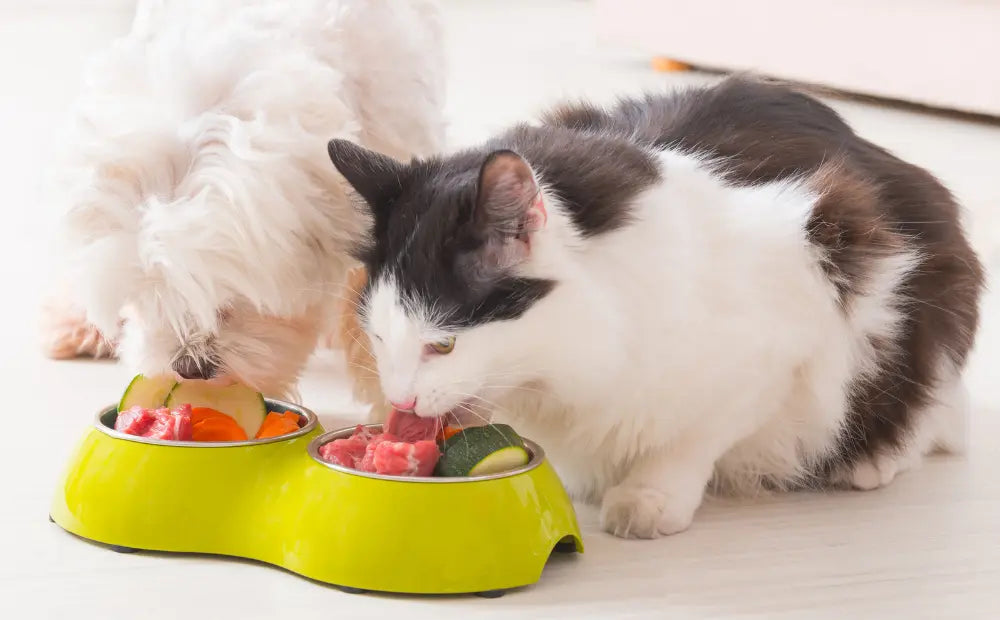
Are Added Vitamins Really Necessary for Your Pet’s Homemade Meals?
Homemade meals made with fresh ingredients can feel like the healthiest choice for your pet, but whole foods alone rarely provide complete nutrition. Nutrient gaps in calcium, taurine, and key vitamins can put pets at risk over time. This guide explains why supplements aren’t the enemy, how they work with fresh food to cover hidden deficiencies, and how to choose safe, effective options that keep your dog or cat truly healthy.
When you’re chopping fresh carrots or simmering that chicken to prepare a meal for your furry friend, have you ever wondered, "Can whole foods alone truly cover all my pet’s nutritional needs?"
Fresh ingredients are fantastic, but dogs and cats have quite different nutritional needs when compared to humans. As a result, your pet may not get all the necessary nutrition even from the most thoughtfully put-together meals.
Yet, a lot of people still believe that synthetic vitamins and minerals are somehow inferior or even harmful to our pets. That idea is completely wrong.
Supplements are not only safe to use; they are sometimes necessary, especially when preparing homemade food. Let’s look at these missing nutrients more closely and discover ways to provide a balanced diet for your pet.
Why Whole Foods Aren’t Always Enough (No Matter How Organic!)
The idea of feeding only whole, unprocessed foods feels healthy and natural. But pets aren’t miniature humans. Their bodies have unique, non-negotiable needs. For example:
-
Cats are "obligate carnivores," which means they require taurine—an amino acid abundant in hearts and livers—to avoid life-threatening heart or vision issues. Yet even a steak-heavy diet might lack enough.
-
Dogs are more flexible, but they still rely on the perfect calcium-phosphorus combination for bone health. The problem is: meat is rich in phosphorus but lacks enough calcium.
-
The "fresh food fallacy": Soil depletion, cooking methods, and storage can strip nutrients from even the best ingredients. Imagine needing to feed your lab six cups of kale daily just to hit their vitamin K quota. It’s impractical!
-
Micronutrients: Although Manganese is only needed in small amounts, it is required for healthy bones, metabolism, and works as an antioxidant. As long as you feed your pet whole foods that are high in fiber, competing nutrients such as calcium and iron can hinder the absorption of manganese. Over time, that could lead to a deficiency.
The Hidden Nutritional Gaps in Homemade Pet Food And How to Fix Them
Even the most well-intentioned DIY diets can miss key nutrients, putting your pet’s long-term health at risk. Sure, whole foods beat factory-made pellets any day, but without careful planning, your furry friend might be deprived of the essentials they need.
1. Calcium: The Overlooked Bone Builder
Raw meat, the main ingredient of most DIY pet meals, has a big problem: low calcium. And when calcium levels don’t balance out phosphorus (which meat has plenty of), things can go south fast. Over time, this imbalance can lead to:
-
Brittle bones and higher fracture risk
-
Metabolic bone disease (especially in puppies and kittens)
-
Hormonal issues like hyperparathyroidism
How to Fix It:
You’ve got options. If your pet can handle it, adding raw, ground bone (about 10-15% of their meal) is the most natural fix. Not into bones? Finely crushed eggshells work wonders.
Just ½ teaspoon per pound of meat balances things out with about 1,000 mg of calcium, effectively offsetting the meat's high phosphorus content. Or, if you’d rather keep it simple, calcium supplements (like calcium citrate) can do the trick, but check with your vet for the right dose.
2. Taurine: The Life-Saving Nutrient for Cats
Dogs can make their own taurine, but cats need it directly from their food, and a shortage can be deadly. Taurine is crucial for reproduction and fetal development, checks heart disease (specifically dilated cardiomyopathy), and prevents retinal degeneration.
How to Fix It:
Organ meats like heart and liver are taurine goldmines. Adding a bit to each meal helps. But since cooking destroys some taurine, using supplements is the smart option. Our vets can recommend the right amount based on your cat’s diet.
3. Vitamins
Muscle meat lacks key vitamins, something most pet owners don’t realize. And if that’s not enough, cooking and storage can strip even more nutrients out of your pet’s food.
Take vitamin D, for example. It’s barely present in muscle meats to begin with, and without enough of it, your pet’s body can’t properly absorb calcium. Over time, that sets the stage for weak bones and other serious issues.
So what’s the fix? Most experts recommend adding 100-200 IU of vitamin D3 per pound of food, but always check with your vet first. A tiny tweak like this can make all the difference between a diet that looks complete and one that actually is.
Vitamin E degrades quickly when cooked (50-80% loss) or exposed to air and light; adding 2-4 IU per pound of body weight daily maintains proper levels. B vitamins, especially thiamine (B1), are damaged by freezing (up to 50% loss) and enzymes in raw fish.
A pet-specific B-complex supplement ensures these nutrients aren’t missed. Even well-planned homemade meals often need these targeted additions for complete nutrition.

Supplements Demystified: Busting Myths
Let’s tackle the big fear: “Are lab-made vitamins ‘unnatural?’” The answer is NO! “Synthetic” just means nutrients made efficiently in controlled settings, but they’re molecular variants of natural versions.
It’s also not true that supplements are unsafe. Organizations like AAFCO set strict limits so overdosing is nearly impossible in commercial or vet-guided mixes.
Things Savvy Pet Parents Should Know
Bioavailability, which deals with how well your pet's body absorbs nutrients, makes all the difference between what you feed your cat or dog and its health. Without good bioavailability, a bowl full of nutrients means nothing if your pet's body can't unlock them.
For instance, synthetic vitamin D3 (cholecalciferol) is generally more bioavailable than synthetic vitamin D2 (ergocalciferol), meaning your pet needs just a little vitamin D3 in the diet to reap big benefits.
Pet parents should take note that "natural" isn’t always practical. For example, while spinach is calcium-rich, its oxalates block absorption. Sometimes, a precision-formulated supplement is simply the smarter path to real nourishment.
Less bioavailable forms of nutrients can still be effective when used in higher quantities to ensure proper absorption. However, using these types of vitamins and minerals can be more costly.
Reputable pet food brands prefer highly absorbable vitamins and minerals, taking the guesswork out of nutrition. And while one-size-fits-all trends come and go, thoughtful supplementation lets you tailor nutrition to your pet’s unique needs. An adult Chihuahua’s needs couldn’t be more different from a growing Maine Coon’s, for example.
Targeted additives bridge gaps specific to age, breed, or health quirks. Best of all? Pre-mixed supplements from trusted brands transform your wholesome home cooking into complete, balanced meals.
Using more bioavailable forms of vitamins and minerals can be more costly, but less bioavailable forms can be used effectively when dosed appropriately.
How to Supplement Safely
Navigating pet supplements is simpler than you think when you know the rules. Start with expert guidance and consider partnering with a board-certified veterinary nutritionist to create a tailored plan for your pet.
Secondly, when choosing supplements, be a label detective. Look for clear dosing instructions, AAFCO or NRC compliance seals, and total transparency about the ingredients used. Steer clear of vague labeling like "mineral blend" and choose pet food with specific labeling like "calcium carbonate" or "zinc gluconate" to be completely sure of what’s going into your pet’s bowl.
Most importantly? Skip kitchen experiments. Some human supplements aren’t pet-safe. Something as common as human vitamin D can be toxic to animals, while "all-in-one" powders often contain risky excesses of iron or copper. Stick to vet-approved products formulated exclusively for animals.
The Bottom Line: Why Added Vitamins and Minerals Aren’t the Enemy
The idea that synthetic vitamins and minerals are bad for your pet is just not true. In fact, these supplements are often necessary to ensure your dog or cat gets a truly balanced diet.
Many pet owners swear by homemade meals, and for good reason. Fresh, whole-food recipes can be healthier than processed kibble or canned options. But if you’re going the DIY route, precision matters. Skip just one key nutrient, and over time, your pet could face serious health issues.
Even the highest-quality ingredients can fall short. Nutrient levels vary between food sources, while some compounds interfere with absorption.
The good news? With some research (and maybe your vet’s advice), you can bridge those gaps, giving your pet the perks of fresh food and complete nutrition. Bottom line? Supplements aren’t cheating; they’re smart pet parenting.
